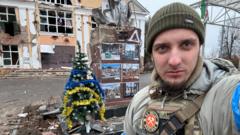Soldiers recount their experiences during Ukraine's retreat from Kursk, highlighting a lack of organization and communication. Amidst ongoing military operations against Russian forces, they express disappointment over international negotiations that impact their homeland.
Ukrainian Soldiers Reflect on Their Chaotic Retreat from Kursk

Ukrainian Soldiers Reflect on Their Chaotic Retreat from Kursk
In a firsthand account, Ukrainian soldiers share the tumultuous details of their recent withdrawal from the Russian border, describing disarray and a complex geopolitical landscape.
Until recently, Artem Kariakin and his battalion made frequent crossings into the Russian town of Sudzha, but their latest trip last week captured the frenetic essence of Ukraine's withdrawal from the Kursk region. With video evidence showing burnt-out vehicles scattered across the battlefield, Artem narrates a scene fraught with danger, as the unit narrowly escaped an incoming drone strike. "We were lucky," he reflected. Yet, the retreat to Sudzha, previously the largest Ukrainian-held town in the Kursk region, was marred by disorganization; Artem admits, "It was pretty chaotic," attributing the confusion to a delayed withdrawal order and communication failures, particularly the malfunctioning Starlink satellite systems.
Despite the chaos, Artem maintains that the Kursk offensive achieved its goal of diverting Russian troops from Ukraine's eastern front. He concedes, however, that the depth and strategy of their advance could have been better planned. While he and his men executed their retreat, political developments unfolded as US President Donald Trump engaged in discussions with his Russian counterpart, Vladimir Putin. Artem found the contrast between the soldiers' harsh realities and the political discussions "absurd," voicing disappointment in the prospect of relinquishing Ukrainian territories for temporary peace.
The offensive, launched last August, surprised Russia, but Artem remained skeptical about any agreement involving territorial exchanges, viewing the actions as critical to Ukraine's security. Notably, Ukrainian cross-border operations continue, further exemplifying the ongoing battle for territory and the strategic importance of these incursions.
Among those orchestrating these cross-border raids is Serhiy, a former Russian citizen turned Ukrainian fighter, who acknowledges the complexities of the situation. He introduced a recent nighttime mission aimed at recovering armored vehicles. The present risks are palpable—glide bombs, drones, and artillery pose constant threats. Even as Serhiy's vehicle boasts countermeasures against drone attacks, he understands the persistent dangers of enemy warfare.
The pursuit for a damaged Bradley armored vehicle exemplified both challenges and responses to Russian aggression. Ultimately successful in locating the vehicle, Serhiy is acutely aware of how the shaky status of US military support could impact Ukraine’s efforts, especially with increasing talk of peace negotiations that could jeopardize their security.
"We must remain firm," Serhiy asserts, recognizing that European allies may not be able to fill the potential gaps left by US distancing. Like many Ukrainians, his longing for peace does not overshadow the belief that it should not come at a detrimental price. The ongoing conflict's complexities keep the situation precarious, with soldiers like Artem and Serhiy voicing a shared hope for resolution, but on terms that uphold Ukrainian sovereignty.






















